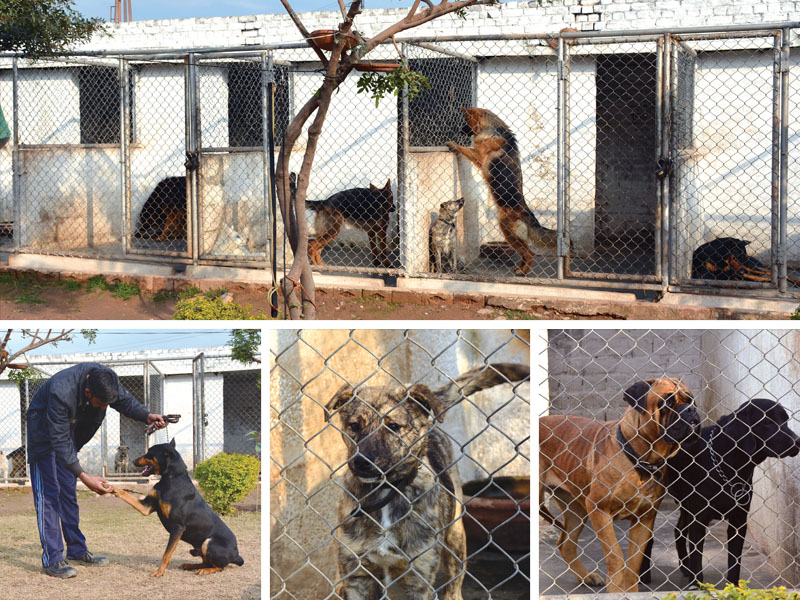
Some people refuse to feed them. Some refuse to let them interact with their children. Some people even refuse to touch them. And yet, these marginalised beings are capable of playing a key role in fighting terrorism.
As far as detection of drugs, bombs, and other contraband goes, no machine can match their skills. In terms of courage and loyalty, few patriots can compete with them.
But like many of the bravest soldiers, they are forgotten once they leave service.
They are man’s four-legged best friend — dogs.
After the Peshawar massacre, law-enforcement agencies are busy enhancing security measures across the country. But the cost of many security options can be a steep obstacle. This is where dogs come in.
According to a few of the senior police officials The Express Tribune spoke with, dogs could be the low-tech, and cost, solution that helps win the war against terror. In fact, if not for the fact that dog ownership is considered taboo in some circles, they could play an even bigger role in crime fighting.
Therefore, interest in dog training for security duties has increased since the attack on Army Public School in Peshawar last year.
The Banigala Dog Centre, situated in the capital’s outskirts, is one of the few centres in the city training a variety of breeds — some with big barks, some with big bites, and some with big brains — for the army and a few private institutions. Over the last 13 years, thousands of dogs have ‘graduated’ from the centre, under the watchful eye of trainer Ajmal Kayani.
Kayani said the army has its own dog centre, which focuses on a few specialised breeds, adding it could not meet the private sector’s demand for trained K-9s.
He said many individuals have approached his centre to get dogs, mostly for security. Besides, “many private schools also asked about trained dogs for the protection of schools”, but he refused to share the schools’ names.
“In the future, the demand for dogs will keep increasing as dogs are more loyal and reliable than technology,” said Kayani.
The centre, set up on a two-kanal area, trains various dogs, including pugs, bull terriers, and shih tzus. But the demand for German Shepherds, Labradors and Rottweilers is high due to their high intelligence and utility as security dogs, he added.
He said there are three core training programmes for dogs — attacking, sniffing and tracking. In attacking, guard dogs are trained to attack intruders in buildings and homes. Training usually begins when the pup is around five months old, Kayani explained, pausing as Bento, a playful two-month-old Labrador, came along.
“Sniffer training is the most important part, where they learn to pinpoint any suspects or material. After training, dogs can find evidence at crime scenes, chase suspects, detect explosives, drugs and cash. Training is four months long and ‘candidate’ dogs should be around seven-months-old,” he said. Tracking is a related skill in which dogs are trained to locate specific things.
During training, dogs are fed fresh food in a diet which includes cereals such as rice, along with meat, milk and dog food, explained Kayani.
Babar Khan, the owner of the centre, explained where he got his love of dogs. He told The Express Tribune that from the time he was a child, he would adopt stray dogs. When he was 14, he kept a bulterian — a south Asian bull terrier — as a pet. “I remember, after school, I kept the puppy in my bag so my parents would not find him,” said Khan.
Khan said he later left home, shifted to Islamabad and established the centre. He suggested that the government encourage dog training by providing land where people like him could establish centres to promote dog ownership in the country.
Dr Shoaib Suddle, a criminology expert and former inspector general of the Sindh Police, said in the 21st century, no one can deny the importance of technology, but dogs also have a significant role in fighting terrorism. “Pakistan is fighting a war and we must equip our police department properly by establishing dog centres.”
Suddle said in the past, the idea would be floated and canned due to lack of funds, adding that in many countries, people kept dogs as pets, but in Pakistan cultural issues are also a problem. Referring to Johannesburg, South Africa, Suddle said the city was for long a hub of criminal activities until their police began using dogs which dramatically reduced crime rate. “This could be done in Pakistan as dogs can play an important role, even in the reduction of minor crimes,” he remarked.
Islamabad SSP Operations Mirwaiz Niaz Khan said dogs have a significant role which cannot be ignored. “Machines can’t do what they can,” he said, while noting that across the world, dogs have a front line security role, while in Islamabad, sniffer dogs are only used in the security details at the Prime Minister House and the Presidency. He said the only down side was that dogs needed breaks every 20-odd minutes when they were on sniffing duty.
He said the Islamabad Police had a dog centre in the Rescue 15 office when Kaleem Imam was the IG but the project was winded up due to lack of funds. He explained that simply establishing a centre was not enough. “Retraining is a bigger challenge,” he said, adding that a request for funds for a new dog centre has been sent to the Interior Ministry.
Afzal Ali Shigri, another former Sindh IG, agreed with Suddle. He praised a police dog centre in the UK which he visited during his time as a top cop. He appreciated the establishment of private dog centres, but added that the police should establish their own.
Meanwhile, as cops continue mulling over how to raise funds for their own dog centre, Bento the Labrador is having a ball while chasing one, still two months, or roughly one dog year, short of school.
Published in The Express Tribune, February 2rd, 2015.









1732549780-0/Speaker-Na-photo-22_04_2014-(1)1732549780-0-270x192.webp)







COMMENTS
Comments are moderated and generally will be posted if they are on-topic and not abusive.
For more information, please see our Comments FAQ